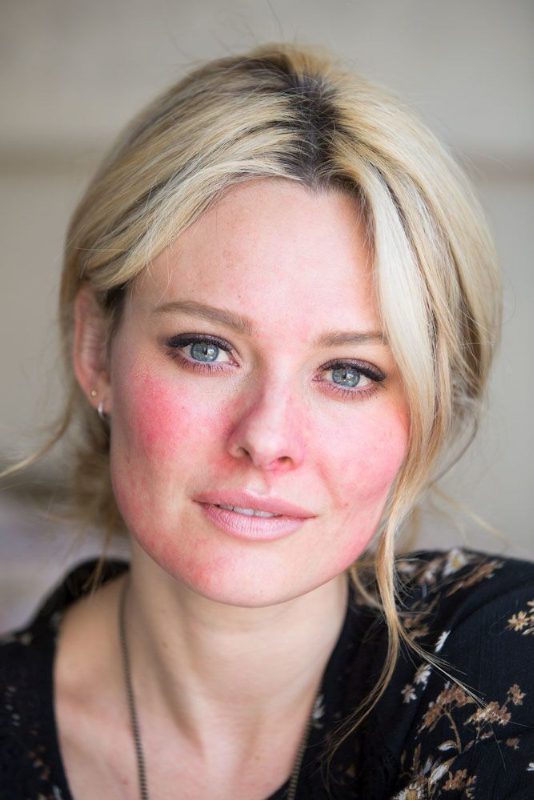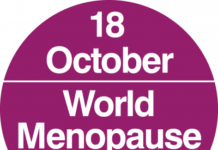
A day in the life experience that proves rosacea is more than skin deep
Alone and red faced – looking beyond the cosmetic issue of rosacea
A beautiful woman walks down the busy streets of Covent Garden, London and heads turn. She walks into a bar and orders a glass of wine; people look on and whispers murmur.
For genetically gifted Sarah Jagger, you’d think she was used to people staring. Yet she feels self-conscious today. Her first thoughts are that people are negatively judging her, ‘that it is my skin they’re staring at’.
For approximately 10% of the UK population,[1] this can be an everyday reality caused by the skin condition rosacea.
Celebrity make-up artist, Sarah Jagger, braved public reactions to the very visual symptoms of a rosacea flare-up to highlight the impact this common skin condition has on sufferers’ mental health and wellbeing.
To address the current lack of rosacea awareness, Sarah, herself a rosacea sufferer, used her make-up expertise to show the visible symptoms of a rosacea flare up. Together with Embarrassing Bodies’ Dr Dawn Harper and Dr Anton Alexandroff, Consultant Dermatologist at University Hospitals Leicester, she took to the streets of London to see the public’s reaction and experience first-hand current perceptions and misconceptions towards the condition. This was part of the ‘Experience My Rosacea’ disease awareness campaign.
“It was a truly insightful experience,” commented Sarah, “I spend my time helping people cover up their imperfections and help them feel confident in their skin. However, during this experience I felt increasingly conscious of those around me, constantly wondering what they were thinking. It was completely isolating.”
Rosacea is a relapsing, multi-symptom, long-term skin condition, characterised by facial redness and flushing, caused by abnormal blood flow to the top layers of the skin.[2] Other symptoms which can occur are bumps and pimples (papules and pustules) and, in severe cases, facial disfiguration, if left unmanaged.[2] Yet despite rosacea affecting approximately 10% of the UK population,[1] sufferers continue to suffer in silence – with individuals often being emotionally affected by both their appearance and associated social stigmas.
A nationwide survey comparing male and female faces with and without the visible symptoms of rosacea showed just how pervasive the influence of rosacea can be, with people admitting to be less likely to believe that a person with facial redness is married or dating, and less likely to believe they are intelligent, trustworthy or reliable.[3]
Of her own experience with rosacea Sarah commented: “I have suffered from rosacea for a long time and especially when I was much younger, it was not just the physical symptoms that affected me; it had a real impact on my self-esteem. Through my involvement in this campaign, I want those with the condition to realise that they are not alone and that there are people and resources out there that can help.”
On the day, members of the public interviewed had limited awareness of rosacea. Of those who knew what it was, many held incorrect perceptions about it, including that the red facial flushing associated with the condition was caused by drinking alcohol. Despite being so common, a recent survey revealed that nearly one-third of people are unaware of what it is,[4] and it remains misunderstood, and often misjudged.
For sufferers, the impact of rosacea can be complex and far reaching. Due to its visible nature, and the fact that it affects the face, it often affects self-esteem and consequently, anxiety and depression are common among sufferers.[5],[6]
Dr Dawn Harper said: “I’ve heard from patients how having rosacea affects them day-to-day, but this is the first time I have seen the sort of reactions that people with rosacea can face. I’m pleased to be involved in this campaign as I think it is important for rosacea sufferers to seek a diagnosis for this condition and know there is help available.”
Sufferers often go for extended periods of time before seeking a correct diagnosis and treatment; often relying on cosmetic products to cover up the symptoms rather than addressing them. Rosacea’s exact cause is unknown but chronic inflammation is believed to play a key role. Certain triggers: heat, cold, intense physical exercise, alcohol and caffeine, can intensify it.[1],[5] Until recently, rosacea management was frequently limited to dietary and lifestyle adjustments such as avoiding key triggers.[1]
Dr Anton Alexandroff, Consultant Dermatologist at University Hospitals Leicester, said: “Rosacea is often misunderstood and until now we have been extremely limited in the options we can offer people suffering from facial redness. Some patients are prescribed anti-inflammatory antibiotics – which treat the pimples and pustules associated with rosacea but fail to combat facial redness and flushing. But different treatment options are becoming available – so people suffering need to speak to their healthcare professional. Typically the symptoms associated with rosacea get worse if left untreated so it’s key that we recognise and treat this condition.”
To further raise awareness of rosacea and to create an online community for rosacea sufferers, the ‘Experience My Rosacea’ microsite has been created: http://www.experiencemyrosacea.co.uk. Here, those with rosacea, or an interest on the subject, can share stories and advice from their own blogs. These include posts on personal experiences with rosacea, as well as general skincare/beauty tips.
To find out more about rosacea and the Experience My Rosacea campaign, please visit http://www.experiencemyrosacea.co.uk.
For further information about the company, please visit: http://www.galderma.co.uk
Help keep news FREE for our readers
Supporting your local community newspaper/online news outlet is crucial now more than ever. If you believe in independent journalism, then consider making a valuable contribution by making a one-time or monthly donation. We operate in rural areas where providing unbiased news can be challenging. Read More About Supporting The West Wales Chronicle






















